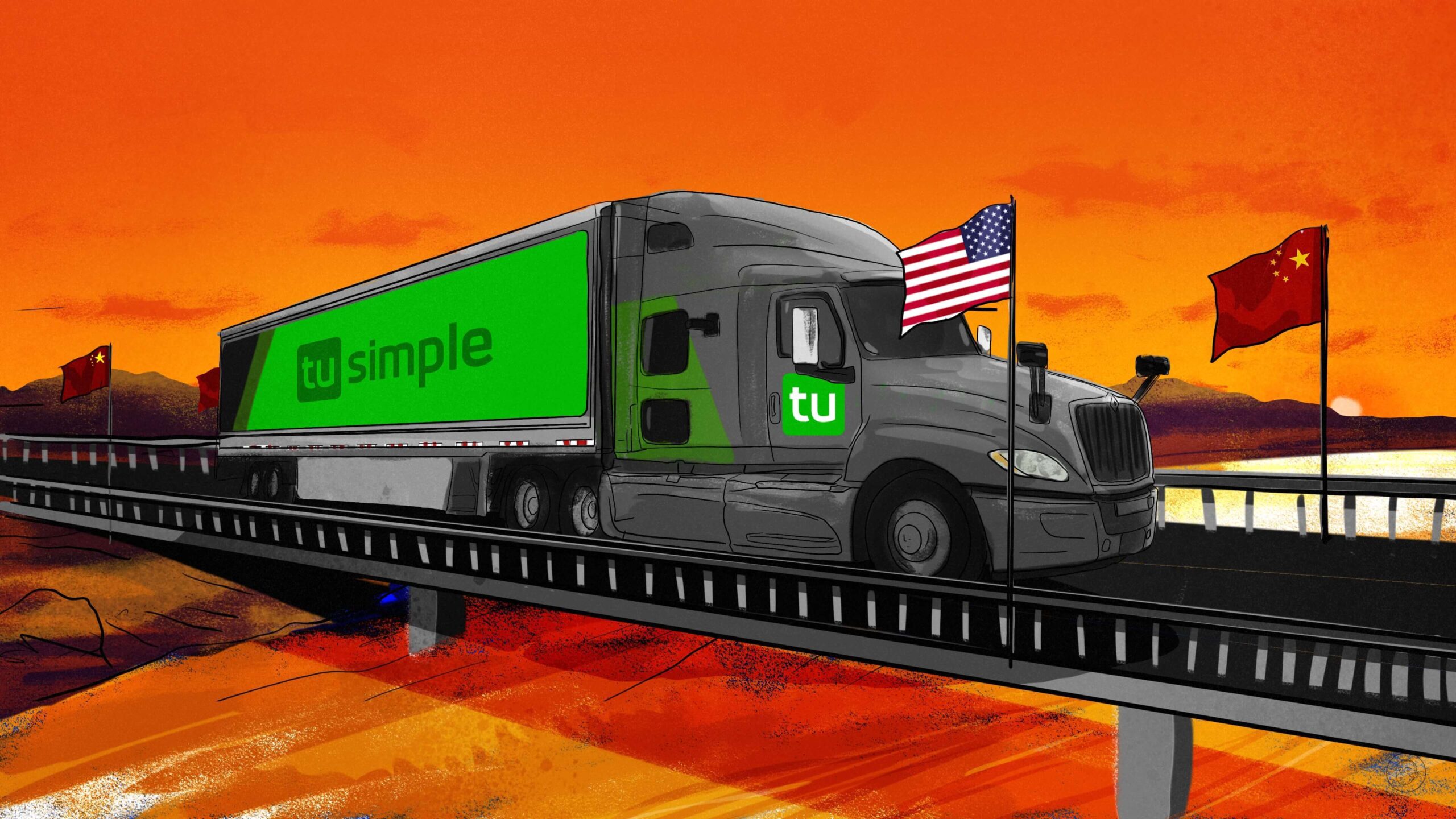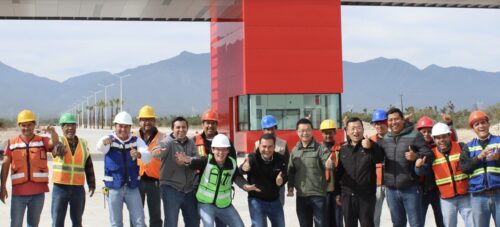Self-driving trucks with Chinese ties face a long road ahead in the U.S.
Autonomous freight transport company TuSimple pumps the brakes under pressure from Washington.

TuSimple 图森未来, the once-promising Nasdaq-listed company whose self-driving trucks were designed to revolutionize long-haul delivery in the U.S. and China, has hit major roadblocks in the form of internal turmoil and U.S. government probes into alleged failure to protect technology developed in America.
The trouble at San Diego–based TuSimple, whose partners include United Parcel Service and Volkswagen AG, stems from its relationship to Hydron Inc. 图灵智卡, a privately held startup that TuSimple’s founders established with Chinese backing in China.
TuSimple’s big-rig trucks, mounted with cameras and sensors to navigate the roads safely without a human driver, were initially pitched to investors as promising efficiency and economy on the highways at a time when the U.S. is facing soaring fuel prices and a shortage of long-haul truckers.
For a little while, the road looked smooth. TuSimple listed shares on the Nasdaq in April 2021, raising $1.35 billion. Share prices climbed steadily to a June 2021 high of $79.84 each, nearly double the IPO price of $40 per share. TuSimple opened offices in Fort Worth, TX, and Tucson, AZ, and, at one point, its ranks swelled to nearly 1,400 employees.
Company founders Hóu Xiǎodí 侯晓迪 and Chén Mò 陈默 were both born in China but made North America home. Hou graduated from Caltech and Chen became a naturalized Canadian.
China news, weekly.
Sign up for The China Project’s weekly newsletter, our free roundup of the most important China stories.
U.S. data worries
The road got slippery for TuSimple in 2021, when Chen founded Hydron, which designs and makes autonomous-ready, hydrogen-powered trucks. Though based in Ontario, CA, east of Los Angeles, Hydron was registered in Hong Kong, China, and Delaware, according to public filings. Chen stepped down as TuSimple’s chairman in March 2022, and in June 2022, Hydron announced he would lead the company as CEO. Then, in November 2022, Chen returned as chairman of TuSimple’s board, a position he retains today, according to TuSimple’s website.
In February 2022, the U.S. Treasury Department’s Committee on Foreign Investment in the U.S. (CFIUS) said that there were no national security threats posed by a sizable 2017 investment in TuSimple by Charles Chao (曹国伟 Cáo Guówěi), CEO of Chinese internet portal Sina. TuSimple then signed a National Security Agreement with CFIUS, committing to limit external access to certain of its data and technology.
In March 2022, TuSimple was considering selling off its China operations due to the potential risk of data transfer, Reuters reported.
In early October 2022, amidst a climate of increased tensions between Beijing and Washington over, among other things, data security, U.S. President Joseph Biden announced plans to ward off “the use of technology, data, and automated systems in ways that threaten the rights of the American public.”
In late October, the Wall Street Journal reported that CFIUS was investigating TuSimple for a possible breach of its agreement to protect technology developed in the U.S. The Journal also reported that TuSimple was suspected of having defrauded investors by transferring key information to Hydron. The allegations of fraud came from investigators at the Federal Bureau of Investigation and the Securities and Exchange Commission. Former TuSimple executive Chen, now at the helm of Hydron, spends most of his time in China, which also is the locus of most of Hydron’s operations, the Journal reported.
TuSimple later revealed that it also had been conducting its own investigation and denied it transferred core information about its autonomous driving software systems to Hydron.
Soon after news of the investigations broke, TuSimple went into a skid: Hou was fired as CEO, and TuSimple laid off about 25% of its workforce in December 2022, leaving its U.S. and China operations with around 600 employees each.
Now the company risks being delisted from Nasdaq after it failed to submit an annual financial report for 2022 because its auditor, KPMG, ended their relationship due to the firm’s troubles. In March 2023, Hou resigned from the TuSimple board after other board members said that he was trying to poach staff.
CFIUS has teeth
Lǚ Chéng 吕程, who replaced Hou as TuSimple CEO, has tried to soothe investors. In March, he told FreightWaves, a trade publication, that the firm is cooperating with CFIUS and that “the temperature has cooled down a lot.” Lu said that TuSimple was shifting its focus away from test-driving autonomous trucks on American highways toward further developing the technology that makes driverless trucking possible.
CFIUS, once a relatively obscure agency of the U.S. government, saw its authority beefed up when former president Donald Trump signed the Foreign Investment Risk Review Modernization Act (FIRRMA) in August 2018.
As the Biden administration intensifies government protections, there now are signs that CFIUS is ramping up penalties for leaking technology made in the U.S. or for failing to disclose investments from foreign government-related entities. The CFIUS penalties range from $250,000 up to “the value of the transaction.”
Before the new guidelines, CFIUS only made public two instances in which it imposed penalties — of $750,000 and $1 million — on two companies for breaching National Security Agreements.
Information about TuSimple’s obligations to CFIUS under its National Security Agreement is not publicly available. If TuSimple transferred information or technology to Hydron, it remains to be seen how CFIUS would value that loss, but it is unlikely that it would be a slap on the wrist.
One lawyer with experience working on CFIUS cases told The China Project that company breaches of National Security Agreements can be inadvertent and over small details, in which case, CFIUS can show leniency in reaching a resolution.
But, the lawyer said, “if the violation goes to the core of what the agreement is supposed to protect, a company’s got to expect that CFIUS is not going to take that lightly.”
When introducing the new CFIUS penalty guidelines, Paul Rosen, assistant secretary of the Treasury for investment security, stated that CFIUS “will not hesitate to use all of its tools and take enforcement action to ensure prompt compliance and remediation, including through the use of civil monetary penalties and other remedies.”
Christian Davis, a lawyer who represents clients under CFIUS review at the firm Akin Gump, said that the Department of the Treasury had a history of working with accused parties on compliance.
“But that’s been something that has been criticized by some,” Davis told The China Project. “Something that people say [CFIUS] needs to focus more on is more enforcement.”
In its SEC filings for the five quarters reported between September 2021 and September 2022, TuSimple showed a net loss ranging between $108 million and $116 million.
But the company may be doing better than those losses suggest given the potential sale of its China operations, money saved from layoffs in late 2022, and, according to CFO Eric Tapia, “a balance sheet with nearly $1 billion.”
Still, other Chinese autonomous vehicle (AV) firms exploring plans to sell shares to U.S. investors will aim to avoid repeating TuSimple’s missteps and the attention of U.S. regulators.
Guangzhou-based AV startup WeRide, which counts Bosch and the Carlyle Group as backers, filed for a $500 million U.S. IPO in March, and another Chinese startup, Momenta 初速度科技, is also considering a listing.
The takeaway
A lack of transparency triggered a perfect storm for TuSimple, whose internal missteps, when added to heightened U.S. scrutiny of its connections to Hydron, make for a cautionary tale for Chinese tech firms aiming to tap U.S. capital markets and integrate themselves into the U.S. economy.
Companies:
- TuSimple 图森未来
- Hydron Inc. 图灵智卡
- WeRide
- Momenta 初速度科技
Sources and additional data:
- Is CFIUS Sharpening Its Knife? Publication of First-Ever CFIUS Enforcement and Penalty Guidelines / Ropes and Gray
- CFIUS Investigation: Sina Corporation and TuSimple Holdings Inc. / The Trade Practitioner
- Self-Driving Truck Startup TuSimple Raises $1.35 Billion In Nasdaq IPO / PYMNTS
- TuSimple Co-Founder Mo Chen Launches Hydron, Producing Hydrogen-Powered Autonomous-Ready, Freight Trucks / Hydron Inc.
- TuSimple Probed by FBI, SEC Over Its Ties to a Chinese Startup / Wall Street Journal
- TuSimple co-founder resigns, accused of poaching staff for new venture / TechCrunch
- EXCLUSIVE TuSimple explores sale of China unit after pact with U.S. authorities – sources / Reuters
- Autonomous driving startup eyes US$1b IPO / The Standard
- China Self-Driving Startup WeRide Files for $500 Million US IPO, Sources Say / Bloomberg






